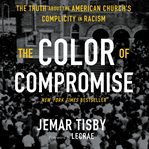Review by Booklist Review
Tisby takes a deep dive into the history of racism in America, beginning with the seventeenth century and concluding with the present day. In this historical context, his goal is to chart the evolution of what he claims is the American church's complicity in racism. Professing believers, he argues, have used racial slurs, participated in beatings and lynchings, joined the Ku Klux Klan, fought wars to preserve slavery, or used the Bible to argue for the viability of slavery and the inherent inferiority of black people. He continues to find such complicity, though more subtle, today, asserting that churches remain among America's most segregated institutions. Making a convincing case for his claims, he offers a variety of remedies under the general rubric ARC, which stands for awareness, relationships, and commitment. More specifically, he suggests that the church consider offering reparations, taking down Confederate monuments, learning from African American churches, and more. He concludes by saying that faith without works is dead, although earlier he has stated that apathy is equally egregious. Happily, his well-reasoned and -written book is a call to action.--Michael Cart Copyright 2019 Booklist
From Booklist, Copyright (c) American Library Association. Used with permission.
Review by Library Journal Review
"God is colorblind." While modern Christians might agree with this statement, the history of evangelical Christianity in the United States is unfortunately filled with both active and complicit racism. Tisby, president of the Witness, a Black Christian Collective, seeks to convey the truth about racism to spur the church to confession, repentance, and reconciliation. He traces the threads of racial persecution and oppression from the colonial era to the modern Black Lives Matter movement. Along the way, there are numerous painful and disturbing anecdotes that demonstrate the cruelty and indifference shown by the majority of churches and white Christians to the plight of African Americans. The final two chapters contain the author's personal suggestions for transforming the church and society toward acknowledging and condemning racism. For instance, he calls for Juneteenth to be declared a federal holiday and for a system of slavery reparations to be created. Since these chapters are personal opinions, they aren't the strongest parts of the book. However, historical racism is undeniable and the church must wrestle with some of these assertions in hopes of racial reconciliation. VERDICT Strongly recommended for all libraries.-Ray Arnett, Anderson, SC © Copyright 2019. Library Journals LLC, a wholly owned subsidiary of Media Source, Inc. No redistribution permitted.
(c) Copyright Library Journals LLC, a wholly owned subsidiary of Media Source, Inc. No redistribution permitted.

